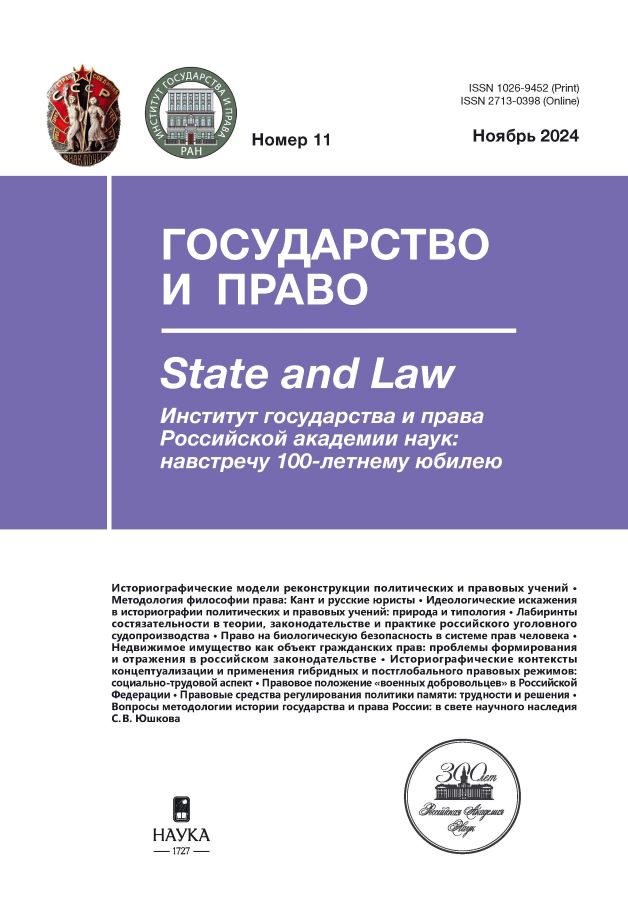Labyrinths of adversariality in theory, legislation and judicial practice of Russian criminal proceedings
- Autores: Vetrova G.N.1
-
Afiliações:
- Lomonosov Moscow State University
- Edição: Nº 11 (2024)
- Páginas: 58–71
- Seção: Court, prosecutor’s office, bar, notarial system
- URL: https://journals.eco-vector.com/1026-9452/article/view/649049
- DOI: https://doi.org/10.31857/S1026945224110054
- ID: 649049
Citar
Texto integral
Resumo
The enactment of the Criminal Procedure Code in 2001, in which the adversariality principle was fixed, catalyzed discussions on the essence of adversariality principle, on its normative display and its role in law-enforcement practice. The article deals with adversariality models, reflected in various forms in legislation due to the different historical periods: from the Statute of Criminal Proceedings of 1864 to the Criminal Procedure Code of the Russian Federation. The author describes the developing theoretical views on adversariality and procedural functions, reflecting as well in procedural legislation due to the expression of adversariality principle. The large focus is on the current criminal procedure rules to determine whether adversariality as a constitutional principle of criminal procedure correlates to concrete normative provisions about acting parties of criminal proceedings. The author affirms that adversariality per se displays itself entirely within the judicial activities, however it should be treated as a principle for the whole criminal procedure, because of its meaning and the role for achievement of criminal proceedings goals.
Texto integral
Sobre autores
Galina Vetrova
Lomonosov Moscow State University
Autor responsável pela correspondência
Email: galina.vetrova@mail.ru
PhD in Law, Associate Professor, Associate Professor of the Department of Legal Criminal Procedure, Justice and Prosecutorial Supervision, Faculty of Law
Rússia, 1, bld. 13 Leninskie gory, 119234 Moscow.Bibliografia
- Bozh’ev V. P. Legal Relations in Criminal Procedure. M., 1975. Pp. 77 (in Russ.).
- Vetrova G. N. “Ahead of his time” – Mikhail Solomonovich Strogovich // Judicial Power and Criminal Procedure. 2018. No. 1. Pp. 118–137 (in Russ.).
- Vetrova G. N. The Content of the Adversarial Principle in the Case Law of the Constitutional Court of the Russian Federation // State and Law. 2016. No. 4. Pp. 52–62 (in Russ.).
- Viktorsky S. I. Russian Criminal Procedure. M., 1997. Pp. 232–234 (in Russ.).
- Golunsky S. A. Issues of the Law of Evidence under the Framework Statute for Criminal Proceedings of the USSR and Constituent Republics // Issues of Procedure and Judiciary in the Novel Legislation of the USSR. M., 1959. Pp. 125, 126 (in Russ.).
- Kokorev L. D. Legal Actors in the Criminal Justice System. Voronezh, 1971. P. 53 (in Russ.).
- Commentary on the RSFSR Code of Criminal Procedure / res. ed. A. K. Orlov. M., 1976. Pp. 385–388 (in Russ.).
- Commentary on the RSFSR Code of Criminal Procedure / res. ed. I. L. Petrukhin. M., 2001. P. 574 (in Russ.).
- Motovilovker Ya. O. On the Principles of Objective Truth, the Presumption of Innocence and the Adversarial Process. Yaroslavl, 1978. Pp. 66, 67, 71–76 (in Russ.).
- Motovilovker Ya. O. The Subject of the Soviet Criminal Procedure. Yaroslavl, 1974. Pp. 35–38 (in Russ.).
- Perlov I. D. In-Court Oral Arguments of the Parties and the Closing Argument of the Defendant in the Soviet Criminal Procedure. M., 1957. P. 15 (in Russ.).
- Polyansky N. N. Theoretical Issues of the Soviet Criminal Procedure. M., 1956. Pp. 103–105 (in Russ.).
- Polyansky N. N. An Essay on the Development of the Soviet Studies in Criminal Procedure. M., 1960. Pp. 82, 83, 113– 121 (in Russ.).
- Polyansky N. N. Essays on the general theory of criminal procedure. M., 1927 (in Russ.).
- Rulings and rulings on criminal cases of the Supreme Court of the RSFSR (1981–1988) / ed. by E. A. Smolentsev. M., 1989. Pp. 320–329 (in Russ.).
- Sluchevsky V. K. Textbook on Russian Criminal Procedure. Introduction. Part I. Judiciary. M., 2008. Pp. 77–83; Part II. Legal proceedings. Pp. 3, 171 (in Russ.).
- Strogovich M. S. Selected works: in 3 vols. Vol. 2. Guarantees of Individual Rights in Criminal Proceedings. M., 1992. Pp. 16–44 (in Russ.).
- Strogovich M. S. The Course of Soviet Criminal Procedure. Vol. 1. M., 1968. Vol. 1. Pp. 32, 89–93, 149–152 (in Russ.).
- Strogovich M. S. Material Truth and Court Evidence in Soviet Criminal Procedure. M., 1955. P. 174 (in Russ.).
- Strogovich M. S. On adversarial and procedural functions in criminal proceedings // Selected works: in 3 vols. Vol. 2. Guarantees of Individual Rights in Criminal Proceedings. M., 1992. Pp. 163, 164 (in Russ.).
- Strogovich M. S. The prosecution and the accused at the preliminary investigation and at the trial. M., 1934 (in Russ.).
- Strogovich M. S. The Nature of the Soviet Criminal Procedure and the Adversarial Principle. M., 1939. Pp. 109, 119 (in Russ.).
- Foinitsky I. Ya. The Course of Criminal Proceedings. SPb., 1996. Vol. 1. Pp. 13, 63, 64, 70, 71; vol. II. Pp. 3, 4 (in Russ.).
- Chel’tsov M. A. The Aims of the Soviet Legal Studies of Procedural Criminal Law in the Period of Extensive Construction of Communism // Issues of Procedure and Judiciary in the Novel Legislation of the USSR. M., 1959. Pp. 63, 64 (in Russ.).
- Sheifer S. A. Evidence and Proof in Criminal Cases. M., 2010. Pp. 133, 134 (in Russ.).
- Ehl’kind P. S. The Essence of the Soviet Law of Criminal Procedure. L., 1963. Pp. 33–35 (in Russ.).
- Ehl’kind P. S. Goals and Means of Achieving Them in the Soviet Criminal Procedure Law. L., 1976. Pp. 52, 53 (in Russ.).
- Yakub M. L. The Procedural Form in the Soviet Criminal Process. M., 1981. Pp. 67–70 (in Russ.).
Arquivos suplementares










